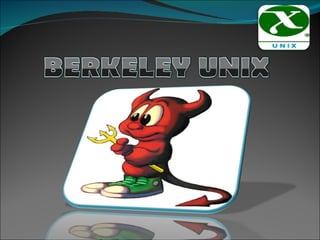
Ait 1 1 group 3 berkeley unix
- 2. Berkeley Software Distribution (BSD, sometimes called Berkeley Unix) is the UNIX operating system derivative developed and distributed by the Computer Systems Research Group (CSRG) of the University of California, Berkeley, from 1977 to 1995.
- 18. Comparison between Network Oss Performance Windows Linux FreeBSD Windows is adequate for routine desktop apps, but it is unable to handle heavy network loads. A few organizations try to make it work as an Internet server. For instance, barnesandnoble.com uses Windows-NT, and they verified by an error messages. For their own "Hotmail" Internet servers, Microsoft used FreeBSD for many years. Linux performs well for most applications, however the performance is not optimal under heavy network load. The network performance of Linux is 20-30% below the capacity of FreeBSD running on the same hardware 2 . The situation has improved somewhat recently.. Since both operating systems are open source, beneficial technologies are shared and for this reason the performance of Linux and FreeBSD is rapidly converging. FreeBSD is the system of choice for high performance network applications. FreeBSD will outperform other systems when running on equivalent hardware. The largest and busiest public server on the Internet uses FreeBSD. FreeBSD is used by Yahoo!, Qwest and many others as their main server OS because of its ability to handle heavy network traffic with high performance and rock solid reliability
- 19. Comparison between Network Oss Free Applications Windows Linux FreeBSD The amount of free Windows software is much less than what is available for Unix. Many Windows applications are provided as "shareware", without source code, so the programs cannot be customized, debugged, improved, or extended by the user. There are huge numbers of free programs available for Linux. All GNU software runs on both Linux and FreeBSD without modification. Some of the free programs for Linux differ between distributions, because Linux does not have a central ports collection. There are many, many gigabytes of FREE software available for FreeBSD. FreeBSD includes thousands of software packages and an extensive ports collection, all with complete source code. Many people consider the FreeBSD Ports collection to be the most accessible and easiest to use library of free software packages available anywhere.
- 20. Comparison between Network Oss Price, and Total Cost of Ownership Windows Linux FreeBSD The server edition of Windows costs nearly $700. Even basic applications cost extra. Users often spend many thousands of dollars for programs that are included for free with Linux or FreeBSD. Documentation is expensive, and very little on-line documentation is provided. A license is required for every computer, which means delays and administrative overhead. The initial learning curve for simple administration tasks is smaller than with Unix, but it also requires a lot more work to keep the system running with any significant work load. Linux is FREE. Several companies offer commercial aggregations at a very low cost. Applications and Documentation is available for little or no cost. There are no licensing restrictions, so Linux can be installed on as many systems as you like for no additional cost. Linux's total cost of ownership is very low. FreeBSD can be downloaded from the Internet for FREE. Or it can be purchased on a four CDROM set, along with several gigabytes of applications, for $40. All necessary documentation is included. Support is available for free or for very low cost. There is no user licensing, so you can quickly bring additional computers online. This all adds up to a very low total cost of Ownership.
- 23. Emma Paolo A. Nuñez Jayson A. Relativo Anthony V. Caya Marmilyn S. Draper Bravnel Enciso
